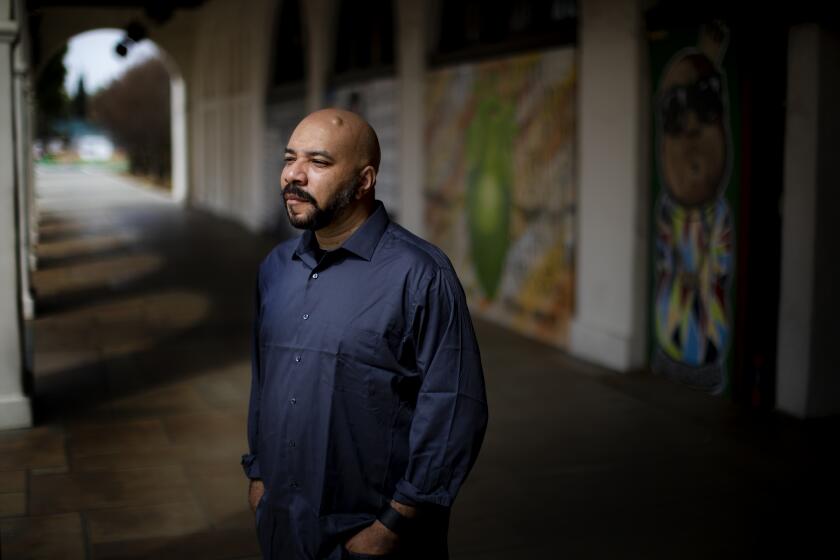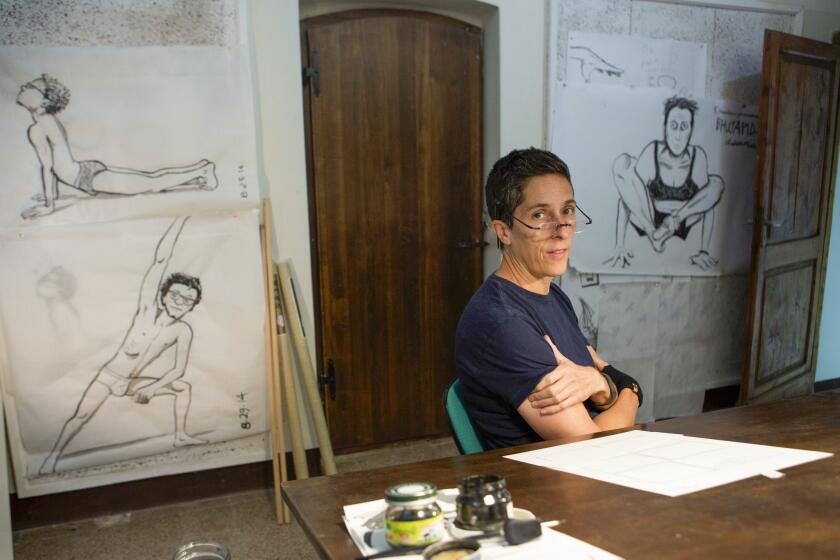Alison Bechdel tried to write a light book. Fortunately, she failed
- Share via
On the Shelf
The Secret to Superhuman Strength
By Alison Bechdel
Houghton Mifflin: 240 pages, $24
If you buy books linked on our site, The Times may earn a commission from Bookshop.org, whose fees support independent bookstores.
After writing two family memoirs that involved a lot of grueling soul-searching, Alison Bechdel thought she would focus on something more lighthearted for her next book — exercise.
But for the creator of such rich, introspective works as “Fun Home,” the heartbreaking story of her coming out and her father’s death, staying on the surface was no easy task.
“I think what I forgot was that there’s no point in writing a book unless you’re doing it to figure something out,” says Bechdel during a recent video call. “I thought I was just going to write a little neat outline about what I learned in these various physical activities. But I didn’t know what I learned. I couldn’t figure out what I was even writing about for a long time.”
Eventually, as she started delving into the various activities she’d taken up during different periods of her life, she started to see that exercise was just an entry point for what became “The Secret to Superhuman Strength.”
“Whether you like exercise or hate exercise, it’s a point of engagement for these other more elusive ideas about the self and the mind and the body that I’m trying to write about,” says Bechdel, whose new book, her first in nine years, is out this week.
In 2006’s “Fun Home: A Family Tragicomic,” the writer and cartoonist looked back at the possible suicide of her father and his secret affairs with men against the backdrop of her coming-out story. Her 2012 follow-up, “Are You My Mother?,” processed her relationship with her mother.
“The Secret to Superhuman Strength” turns out to be further excavation of her personal history and her more recent years as Bechdel learns to embrace interdependence and accept mortality.
Alison Bechdel’s graphic coming-of-age memoir, “Fun Home,” doesn’t exactly seem the stuff of Broadway musicals.
“Part of why I write about my own life, it’s my attempt to freeze all this ceaseless, endless, constant change,” says Bechdel, who was named a MacArthur fellow in 2014. “I just want to put down something that doesn’t move. Life is change.
“I want to be more accepting of change. That’s one of the things I’m struggling for as I move through my life. I want to be easier with the fact that everything changes.”
In the tradition of her earlier memoirs, which deftly weave multiple chronological strands, “Secret” tracks the constant churn of Bechdel’s life alongside the evolution of the fitness industry. The book is split into six sections, each spanning a decade of Bechdel’s 60 years.
Threaded throughout recollections about her serial fixations with solo sports — running, skiing, karate, bicycling and more — are insights into her relationships, her dependence on alcohol and prescription medication and even her unsustainable work habits.
The book took Bechdel eight years from start to finish; she admits she felt stuck at times and couldn’t figure out why.
“But in this bizarre way, [with] the conceit of the book, the way those chapters broke down, I needed to live through my 50s in order to finish the book,” says Bechdel. “I really needed to just live my life for all those years so I could fit it into that chapter of the 2010s.”
Although the events in her life are presented chronologically, the memoir jumps in time. Peeking into the 1950s, 1830s and 1790s, Bechdel connects her metaphysical quest for self-improvement to the lives of those who preceded her in contemplating the relationship between the self and the wider world.
“I started [the book] knowing I wanted to write about [Jack] Kerouac, at least a little bit,” says Bechdel. “I just loved the way he wrote about his own experience of transcendence and the outdoors in ‘The Dharma Bums.’”
A new generation of Black artists is amending and countering comic books’ racist roots. They join a proud tradition of Black pioneers.
Kerouac and the hippie generation led her to the Transcendentalists of the 19th century, whom Bechdel describes as “proto-hippies.”
“They were all vegans and had these really progressive race and gender politics, they were reading Eastern philosophy,” says Bechdel. “I learned more about [Ralph Waldo] Emerson and about his friend, Margaret Fuller, who I’m just obsessed with. And then I learned about the people who inspired Emerson and Fuller — the British Romantics ... I felt a kind of kinship with all of them.”
If it all feels like a sharp turn toward the abstract from the author whose cult comic, “Dykes to Watch Out For” (1983-2008), was a groundbreaking depiction of the lived political reality of lesbians going about their lives — well, Bechdel agrees. At times it felt “futile and pointless and self-indulgent,” she says, to be working on a book about self-care in a time of political crisis.
In fact, when Donald Trump became president, Bechdel revived “Dykes” for the first time in eight years.
“I felt compelled to like, bring them out of retirement,” says Bechdel. “When Trump was elected, my immediate impulse was to return to those characters. Because I had always used the comic strip to figure out what was happening in the world. So that’s what I did. I went to the characters and imagined how they were all feeling and coping with this. It was a little comforting.”
It was the election of President Obama in 2008 that had caused her to end the strip.
“The Bush administration had burnt me out,” she says. “... I was very happy to just let the world go on and I’d work on some other projects.”
But now, post-Trump, as anti-trans legislation is being considered in multiple states, Bechdel finds herself having to revise the Obama-era notion that progress was on a steady march. There’s dissonance for her between the recent political attacks and continuing strides toward inclusion in mainstream culture.
Alison Bechdel, the innovative comic artist known for the graphic memoirs “Fun Home: A Family Tragicomic” and “Are You My Mother,” is one of 21 MacArthur Fellows named Wednesday.
Bechdel’s mainstream success — the acclaim for her graphic memoirs, the Tony Award-winning adaptation of “Fun Home,” even the popularity of the “Bechdel Test” of female representation on-screen — has been a significant part of that progress. It’s also left Bechdel a little unmoored.
“I got my start very much identifying as an outsider, as someone on the margins,” she says. “That outsiderness has been, to me, a huge gift. So to find myself moving more and more to the inside is really confusing. I don’t want to lose that outsider vision.”
Which brings us back to mortality. “I feel like, inevitably, I have kind of lost a bit of my edge,” she says. “Because that’s how the system works. I need to be conscious of not getting lulled into a stupor by those forces — by continuing to just stay true to myself. So that’s what I try to do.”
More to Read
Sign up for our Book Club newsletter
Get the latest news, events and more from the Los Angeles Times Book Club, and help us get L.A. reading and talking.
You may occasionally receive promotional content from the Los Angeles Times.











